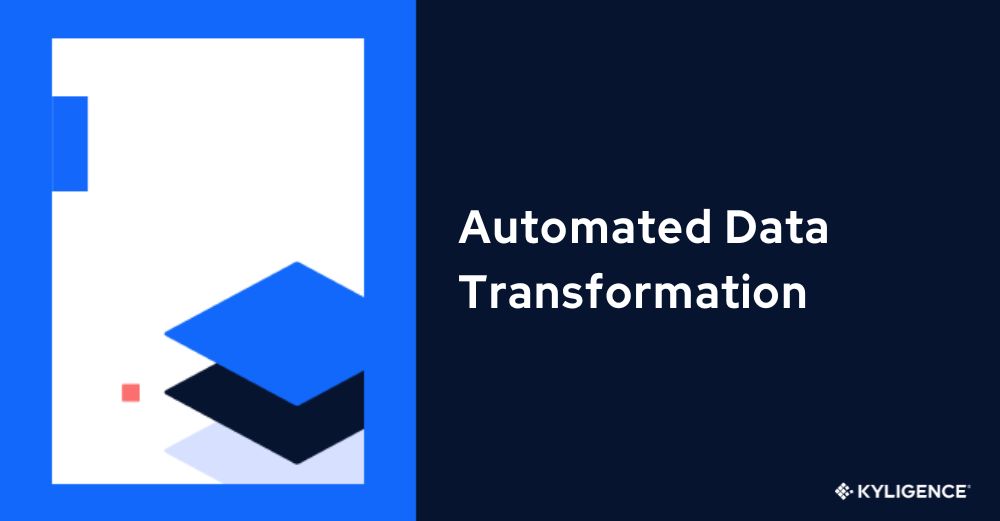Ⓒ 2023 Kyligence, Inc. All rights reserved.

Introduction
Automated data transformation is revolutionizing the way data analysis is conducted. With the increasing volume and complexity of data, manual data transformation processes are no longer efficient or scalable.
Automated data transformation involves the use of tools and technologies to automate the process of transforming raw data into a more usable format.
By automating this process, organizations can save time and resources, allowing data analysts to focus on higher-level tasks such as data interpretation and decision-making.
This blog post explores the benefits of automated data transformation and discusses the next step in this process, which is automated insights. Stay tuned to learn how automated data transformation can revolutionize your data analysis workflows.
What is Automated Data Transformation?
Automated Data Transformation is the process of using advanced technologies and algorithms to automatically convert data from one format or structure into another, without manual intervention.
This approach streamlines the transformation process, ensuring data consistency, reducing errors, and significantly speeding up the time it takes to prepare data for analysis or other purposes.
Advantages of Automated Data Transformation
Automated data transformation offers several advantages that revolutionize the data analysis process. Let's explore some of these benefits in detail.
Increased Efficiency and Accuracy
Automated data transformation eliminates the need for manual data manipulation- saving time and reducing the risk of human errors.
By automating repetitive data transformation tasks, organizations can achieve faster and more accurate data analysis results. This allows data analysts to focus on higher-level tasks, such as data interpretation and decision-making.
Improved Data Quality
Automated data transformation tools often include data cleansing and validation features and ensure that the transformed data is accurate and reliable.
These tools help maintain data integrity by identifying and correcting inconsistencies or errors in the dataset. By improving data quality, organizations can avoid costly mistakes and make more informed business decisions based on trustworthy information.
Enhanced Scalability and Flexibility
Automated data transformation tools are designed to handle large volumes of data efficiently. They can scale to meet the needs of growing organizations without compromising performance.
Additionally, these tools offer flexibility in terms of working with diverse datasets from various sources and formats. This enables analysts to seamlessly integrate different types of data into their analysis workflows, allowing them to explore new insights and adapt to changing business requirements.
These and other advantages empower organizations to streamline their data analysis processes, make better-informed decisions, and unlock valuable insights from their datasets.
The Next Step: Automated Insights
As data transformation continues to evolve, the next step in this process is automated insights. Automated insights take data transformation to the next level by leveraging advanced analytics and machine learning techniques.
These tools can automatically analyze transformed data and generate actionable insights without manual intervention.
From Data Transformation to Automated Insights
Automated insights enable organizations to uncover hidden patterns, trends, and correlations in their data. By automating the insights generation process, businesses can gain a deeper understanding of their data and make more informed decisions.
This advanced level of analysis goes beyond simple data transformation and empowers organizations to extract valuable insights from their datasets.
Kyligence Zen: Empowering Automated Insights
One powerful tool that enables automated insights is Kyligence Zen. It combines automated data transformation with advanced analytics capabilities, and allow users to easily transform and analyze large volumes of data in real-time.
With Kyligence Zen, organizations can accelerate their data analysis processes and make faster, more accurate decisions based on valuable insights.
Kyligence Copilot: Guiding the Way
To navigate the complexities of automated data transformation and insights generation, organizations can rely on Kyligence Copilot.
This intelligent assistant provides recommendations, suggests best practices, and guides users through the entire data analysis process.
Even non-technical users can leverage the power of automated data transformation with Kyligence Copilot, and gain valuable insights without extensive technical expertise.
Challenges and Considerations
While automated data transformation offers numerous benefits, there are also challenges and considerations that organizations need to address. Let's explore some of these challenges in detail.
Data Privacy and Security
Automated data transformation involves handling sensitive data, which raises concerns about data privacy and security. Organizations must ensure that appropriate security measures are in place to protect data during the transformation process.
This includes implementing encryption, access controls, and monitoring mechanisms to safeguard sensitive information. Compliance with data protection regulations is crucial to maintain trust with customers and partners while avoiding legal consequences.
Data Complexity and Integration
Data transformation becomes challenging when dealing with complex data structures and integrating data from multiple sources. Organizations need to carefully design their data transformation workflows to handle these complexities effectively.
This may involve developing custom scripts or using specialized tools that can handle diverse datasets and integrate them seamlessly. Proper data integration strategies and tools are essential to ensure a smooth flow of data throughout the transformation process, enabling accurate analysis.
Skill Gap and Change Management
Adopting automated data transformation requires a certain level of technical expertise and a mindset shift within the organization.
There may be a skill gap that needs to be addressed through training and upskilling initiatives for both technical teams responsible for implementing automation solutions and business users who will leverage the transformed data.
Change management efforts are necessary to ensure a smooth adoption of automated data transformation across the organization- including educating stakeholders about the benefits, providing support during the transition, and fostering a culture of continuous learning.
Conclusion
Automated data transformation is revolutionizing data analysis by increasing efficiency, improving data quality, and enhancing scalability. The ability to automate repetitive tasks and generate actionable insights empowers organizations to make better-informed decisions based on trustworthy data.
While there are challenges such as data privacy, complexity, and skill gaps, the benefits of automated data transformation outweigh these limitations.
By adopting advanced tools like Kyligence Zen and Kyligence Copilot, organizations can accelerate their data analysis processes and unlock valuable insights from their datasets.
Experience the power of automated data transformation for yourself. Try Kyligence free today!
See Also
Revolutionizing Financial Decision Making through Data Analysis
Unveiling the Importance of Website Metrics: Tracking and Analyzing Your Data
Enhancing Efficiency through Superset Analytics: A Comprehensive Data Analytics Guide
Achieving Data Analysis Mastery with AI: A Step-by-Step Guide
Unleashing the Potential of DBT Metrics Layer for Enhanced Data Analysis
